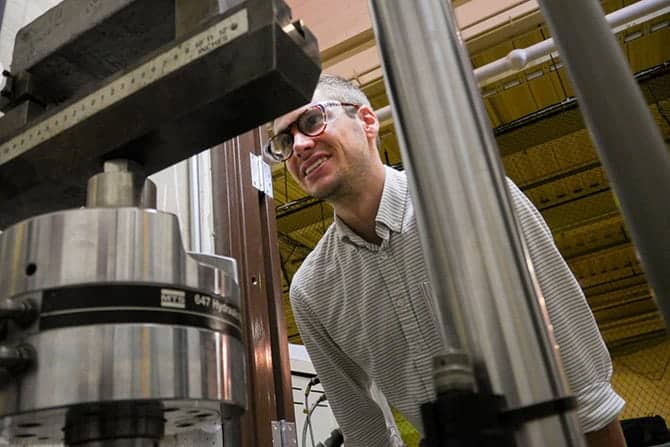Pavement Research Center of Excellence

The Pavement Research Center of Excellence is a research consortium of three Michigan universities and the Michigan Department of Transportation (MDOT). The University of Michigan center conducts research on rigid pavements and paving materials.
Select Projects
Early Age Cracking in Pavements
Internal stresses are present at early ages in Portland Cement Concrete pavements due to restrained curling and axial contraction. The risk of cracking in the pavement is largely associated with the temperature and tensile strength development of the concrete as it cures. The temperature development is heavily influenced by heat released during cement hydration, the temperature of the ingredients and daily and seasonal fluctuations in ambient temperature. It has been observed that thermal stress development is most severe when the peak in the heat development from hydration coincides with maximum daily ambient temperature. Thus, consideration should be given to placing concrete in the late afternoon or evening, especially during summer time placing conditions.
Uses of Recycled Concrete in Michigan
This past project looked into the factors that lead to distress in recycled concrete pavements through both field and laboratory analysis. The field investigation focused on the two areas of concern: the quality of the pavement slab and the quality of the underlying foundation materials. The laboratory study looked into the properties of recycled concrete as coarse aggregate. These properties included absorption, unit weight and bulk specific gravity of the recycled aggregate. Additionally, freeze-thaw durability was conducted at different degrees of saturation.
Premature Deterioration in Michigan Jointed Concrete Pavements on Open Graded Drainage Courses
10% of Open Graded Drainage Courses (OGDC) sections constructed in Michigan have displayed premature transverse cracking and slightly accelerated faulting and spalling. This recent project looked into the possible causes of this premature deterioration. The performance of several OGDC sections were compared to several Dense Graded Base Course (DGBC) sections.
Cause of Concrete Pier Cap Deterioration on the I-75 Bridge over River Rouge in Detroit, and Effectiveness of Repair Methods
This recent project for MDOT looked into the causes of distress on Pier Caps 38 and 39. The purpose of this study was to determine whether the concrete in the pier caps was durable, and if so, whether it could be expected to continue to provide the needed structural capacity in the future. Additionally, it evaluated various repair techniques and determined the feasibility of each proposed repair method.
Effect of Higher Strength and Associated Concrete Properties on Pavement Performance
This ongoing project looks into various properties of high strength Portland Cement Concrete Pavements that have resulted in exceptional long-term performance, particularly in freedom from distress near joints-free edges. This project will identify test methods for these various properties. Additionally, this project will develop revised mix design procedures, including any additional tests, and prototype mix designs which will result in production of concrete for use in pavements that would possess these properties while still meeting current construction requirements and economic considerations.
High Performance Densified Small Particle (DSP) Cements
This research investigated the mechanism and variables which control the tensile strain capacity of strength of high performance Fiber Reinforced Composites (FRC). Additionally, this project worked toward developing a model to predict the elastic and inelastic tensile strain in such composites from energy principles during cracking. This project used Fiber Reinforced DSP mortar specimens that contained fibers in a volume concentration of 0% to 12%.
Freeze Thaw Durability of High Performance Concrete Aggregates
This recently-started project will investigate the freeze-thaw durability of coarse aggregates for use in high performance concrete pavements. Various types and gradations of coarse aggregates will be tested.
Adoption of Rapid Test for Determining Aggregate Durability of Portland Cement Concrete
This past project investigated the Washington Hydraulic Fracture Test (WHFT) to see if it could be adopted by MDOT as a part of the acceptance test procedure for evaluating the frost resistance of coarse aggregates sources in Portland Cement Concrete applications. This project also considered any modifications of the Hydraulic Fracture Index (HFI) that would give it more physical significance.
The Use of Energy Efficient Blended Cements in Concrete Pavements and Transportation Structures
This ongoing study investigates a number of Portland Cements and Blended Cements from different regions of the country. The variations in physical and chemical compositions will be related to their heat and strength development properties, as well as longer term durability properties. This will allow the cement producers to account for various design and environmental considerations when manufacturing cement products.
Related Research
Graduate Study